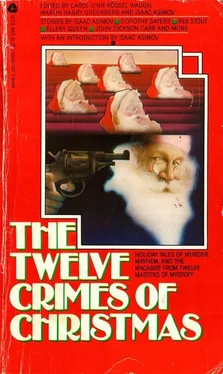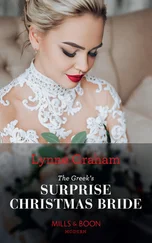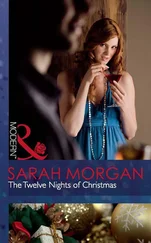Carol-Lynn Waugh - The Twelve Crimes of Christmas
Здесь есть возможность читать онлайн «Carol-Lynn Waugh - The Twelve Crimes of Christmas» весь текст электронной книги совершенно бесплатно (целиком полную версию без сокращений). В некоторых случаях можно слушать аудио, скачать через торрент в формате fb2 и присутствует краткое содержание. Жанр: Триллер, на английском языке. Описание произведения, (предисловие) а так же отзывы посетителей доступны на портале библиотеки ЛибКат.
- Название:The Twelve Crimes of Christmas
- Автор:
- Жанр:
- Год:неизвестен
- ISBN:нет данных
- Рейтинг книги:3 / 5. Голосов: 1
-
Избранное:Добавить в избранное
- Отзывы:
-
Ваша оценка:
- 60
- 1
- 2
- 3
- 4
- 5
The Twelve Crimes of Christmas: краткое содержание, описание и аннотация
Предлагаем к чтению аннотацию, описание, краткое содержание или предисловие (зависит от того, что написал сам автор книги «The Twelve Crimes of Christmas»). Если вы не нашли необходимую информацию о книге — напишите в комментариях, мы постараемся отыскать её.
The Twelve Crimes of Christmas — читать онлайн бесплатно полную книгу (весь текст) целиком
Ниже представлен текст книги, разбитый по страницам. Система сохранения места последней прочитанной страницы, позволяет с удобством читать онлайн бесплатно книгу «The Twelve Crimes of Christmas», без необходимости каждый раз заново искать на чём Вы остановились. Поставьте закладку, и сможете в любой момент перейти на страницу, на которой закончили чтение.
Интервал:
Закладка:
“ ‘It is all right,’ he said to them; ‘Waycross has come home. But by Something, gentlemen, he is growing thinner these days, or it is shadows.’
“Then he told them what he had seen. If you look through the front windows-there-you can look sideways and see out through the doorway into the main hall. He said he had seen Mrs. Waycross standing in the hall with her back to the staircase, wearing a blue dressing gown over her nightgown, and her hair down round her shoulders. Standing in front of her, with his back to Mr. Wilkes, was a tallish, thin man like Mr. Waycross, with a long greatcoat and a tall hat like Mr. Waycross’s. She was carrying either a candle or a lamp; and he remembered how the tall hat seemed to wag back and forth, as though the man were talking to her or putting out his hands towards her. For he said he could not see the woman’s face.
“Of course, it was not Mr. Waycross; but how were they to know that?
“At about seven o’clock next morning, Mrs. Randall, the old servant, returned. (A fine boy had been born to her cousin the night before.) Mrs. Randall came home through the white dawn and the white snow, and found the house all locked up. She could get no answer to her knocking. Being a woman of great resolution, she eventually broke a window and got in. But when she saw what was in the front hall, she went out screaming for help.
“Poor Jane was past help. I know I should not speak of these things; but I must. She was lying on her face in the hall. From the waist down her body was much charred and-unclothed, you know, because fire had burnt away most of the nightgown and the dressing gown. The tiles of the hall were soaked with blood and paraffin oil, the oil having come from a broken lamp with a thick blue-silk shade which was lying a little distance away. Near it was a china candlestick with a candle. This fire had also charred a part of the paneling of the wall, and a part of the staircase. Fortunately, the floor is of brick tiles, and there had not been much paraffin left in the lamp, or the house would have been set afire.
“But she had not died from burns alone. Her throat had been cut with a deep slash from some very sharp blade. But she had been alive for a while to feel both things, for she had crawled forward on her hands while she was burning. It was a cruel death, a horrible death for a soft person like that.”
There was a pause. The expression on the face of the narrator, the plump girl in the brown dress, altered slightly. So did the expression of her eyes. She was sitting beside Muriel, and moved a little closer.
“Of course, the police came. I do not understand such things, I am afraid, but they found that the house had not been robbed. They also noticed the odd thing I have mentioned, that there was both a lamp and a candle in a candlestick; there were no other lamps or candles downstairs except the lamps waiting to be filled next morning in the back kitchen. But the police thought she would not have come downstairs carrying both the lamp and the candle as well.
“She must have brought the lamp, because that was broken. When the murderer took hold of her, they thought, she had dropped the lamp, and it went out; the paraffin spilled, but did not catch fire. Then this man in the tall hat, to finish his work after he had cut her throat, went upstairs, and got a candle, and set fire to the spilled oil. I am stupid at these things, but even I should have guessed that this must mean someone familiar with the house. Also, if she came downstairs, it must have been to let someone in at the front door; and that could not have been a burglar.
“You may be sure all the gossips were like police from the start, even when the police hemm’d and haw’d, because they knew Mrs. Waycross must have opened the door to a man who was not her husband. And immediately they found an indication of this, in the mess that the fire and blood had made in the hall. Some distance away from poor Jane’s body there was a medicine bottle such as druggists use. I think it had been broken in two pieces; and on one intact piece they found sticking some fragments of a letter that had not been quite burned. It was in a man’s handwriting, not her husband’s, and they made out enough of it to understand. It was full of-expressions of love, you know, and it made an appointment to meet her there on that night.”
Rodney Hunter, as the girl paused, felt impelled to ask a question.
“Did they know whose handwriting it was?”
“It was Jeremy Wilkes’s,” replied the other simply. “Though they never proved that, never more than slightly suspected it, and the circumstances did not bear it out. In fact, a knife stained with blood was actually found in Mr. Wilkes’s possession. But the police never brought it to anything, poor souls. For, you see, not Mr. Wilkes-or anyone else in the world-could possibly have done the murder.”
“I don’t understand that,” said Hunter, rather sharply.
“Forgive me if I am stupid about telling things,” urged their hostess in a tone of apology. She seemed to be listening to the chimney growl under a cold sky, and listening with hard, placid eyes. “But even the village gossips could tell that. When Mrs. Randall came here to the house on that morning, both the front and the back doors were locked and securely bolted on the inside. All the windows were locked on the inside. If you will look at the fastenings in this dear place, you will know what that means.
“But, bless you, that was the least of it! I told you about the snow. The snowfall had stopped at nine o’clock in the evening, hours and hours before Mrs. Waycross was murdered. When the police came, there were only two separate sets of footprints in the great unmarked half acre of snow round the house. One set belonged to Mr. Wilkes, who had come up and looked in through the window the night before. The other belonged to Mrs. Randall. The police could follow and explain both sets of tracks; but there were no other tracks at all, and no one was hiding in the house.
“Of course, it was absurd to suspect Mr. Wilkes. It was not only that he told a perfectly straight story about the man in the tall hat; but both Dr. Sutton and Mr. Pawley, who drove back with him from Five Ashes, were there to swear he could not have done it. You understand, he came no closer to the house than the windows of this room. They could watch every step he made in the moonlight, and they did. Afterwards he drove home with Dr. Sutton and slept there; or, I should say, they continued their terrible drinking until daylight. It is true that they found in his possession a knife with blood on it, but he explained that he had used the knife to gut a rabbit.
“It was the same with poor Mrs. Randall, who had been up all night about her midwife’s duties, though naturally it was even more absurd to think of her. But there were no other footprints at all, either coming to or going from the house, in all that stretch of snow; and all the ways in or out were locked on the inside.”
It was Muriel who spoke then, in a voice that tried to be crisp, but wavered in spite of her. “Are you telling us that all this is true?” she demanded.
“I am teasing you a little, my dear,” said the other. “But really and truly, it all did happen. Perhaps I will show you in a moment.”
“I suppose it was really the husband who did it?” asked Muriel in a bored tone.
“Poor Mr. Waycross!” said their hostess tenderly. “He spent the night in a temperance hotel near Charing Cross Station, as he always did, and, of course, he never left it. When he learned about his wife’s duplicity”-again Hunter thought she was going to pull down a corner of her eyelid-“it nearly drove him out of his mind, poor fellow. I think he gave up agricultural machinery and took to preaching, but I am not sure. I know he left the district soon afterwards, and before he left he insisted on burning the mattress of their bed. It was a dreadful scandal.”
Читать дальшеИнтервал:
Закладка:
Похожие книги на «The Twelve Crimes of Christmas»
Представляем Вашему вниманию похожие книги на «The Twelve Crimes of Christmas» списком для выбора. Мы отобрали схожую по названию и смыслу литературу в надежде предоставить читателям больше вариантов отыскать новые, интересные, ещё непрочитанные произведения.
Обсуждение, отзывы о книге «The Twelve Crimes of Christmas» и просто собственные мнения читателей. Оставьте ваши комментарии, напишите, что Вы думаете о произведении, его смысле или главных героях. Укажите что конкретно понравилось, а что нет, и почему Вы так считаете.












